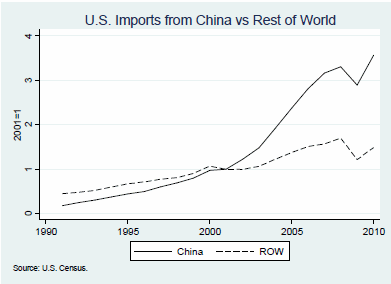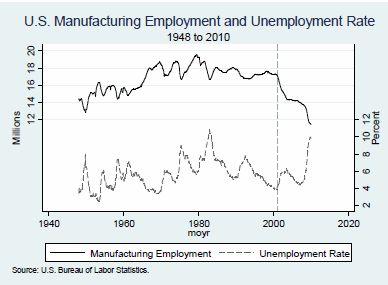How will global trade affect the U.S. elections?
In textbook economic models, adjusting to changes in the economy is deceptively simple. If the labor market suffers a "shock" due, for example, to increased globalization, it adjusts quickly to restore full employment.
In the real world, it doesn't happen like this. It takes time for workers to find new jobs, if they can find them. New businesses and new job openings at existing businesses aren't created instantaneously. And wage adjustments, which create the incentives for workers to move and new jobs to be created, don't happen as fast as the textbooks generally assume.
And now, the effect of international trade and globalization has become a big issue in the presidential campaign. Recent research showing that a large number of manufacturing jobs have been lost to China helps explain why. But what evidence shows that trade with China actually changes voting behavior?
A recent paper from the National Bureaus of Economic Research attempts to answer this question. The research compares voting patterns in regions in the U.S. with different degrees of exposure to changes in trade policy.
It focused on how voting changed after China was granted "permanent normal trading relations" in October 2000. Granting China this status removed the risk each year that imports from it would be subject to increased tariffs, a risk that discouraged U.S. firms from locating in China with the intent of exporting goods to the U.S. market and discouraged Chinese firms from entering U.S. markets.
As the following two figures from the paper show, the result was a large increase in imports from China and a large decline in manufacturing employment.
However, these effects did not hit all areas of the U.S. equally, and that allowed the researchers to identify differences in voting patterns due to the granting of permanent normal trading relations with China. The paper analyzed votes at the county level and focused on Congressional elections because of their frequency (every two years) and because Congressional representatives represent smaller geographic regions than senators or presidents and hence are expected to be more responsive to their constituents' desires.
Two key findings emerged from this research. First, "U.S. counties more exposed to increased competition from China experience increases in the share of votes cast for Democrats in Congressional elections, along with increases in the probability that a Democrat represents a county and the probability of a county switching from a Republican to a Democrat Representative."
Second, the explanation for that voting pattern appears to be that "Democrats are more likely to support policies that limit import competition and that provide economic assistance that may benefit workers adversely affected by trade competition."
Specialization and trade give American consumers a much greater variety of goods at a lower cost than if we tried to produce everything we consume ourselves. It has also had a substantial impact on reducing poverty in developing countries.
However, international trade also imposes substantial costs on domestic workers and businesses that end up paying the price of greater global trade, and the country hasn't done enough to ensure that social insurance programs are available to ease these costs.
In addition, the benefits of increased trade have been concentrated at the top of the income distribution. If they had been more widely shared -- if the income of the working class had not stagnated for decades while income for those at the top soared -- the political backlash might not now be so severe.
It will be interesting to see the extent to which votes in the upcoming presidential election, as well as votes for senators and congressional representatives, reflect the dissatisfaction that so many people have with the consequences of globalization. The winds of change are in the air, but are they blowing hard enough to overcome the entrenched political interests that have brought the country to this point?
If so, where will they take us? Will we close our doors to further expansion of trade and all the benefits that come with it, or will we find a way to keep expanding trade and share its benefits widely and overcome the stagnation of the middle class that has fueled the rise of populist sentiment? I hope things change and that political institutions are up to the task of expanding trade and serving the needs of the many rather than the few.
But it's hard to be optimistic that this type of change is possible. It's very clear, to me at least, that our government institutions have failed to ensure that the promise of globalization is realized -- the idea that we can make everyone better off by distributing the gains from trade broadly and equitably. It will be very difficult to overcome the powerful forces pushing to either retreat from trade or retain the inequitable status quo.


